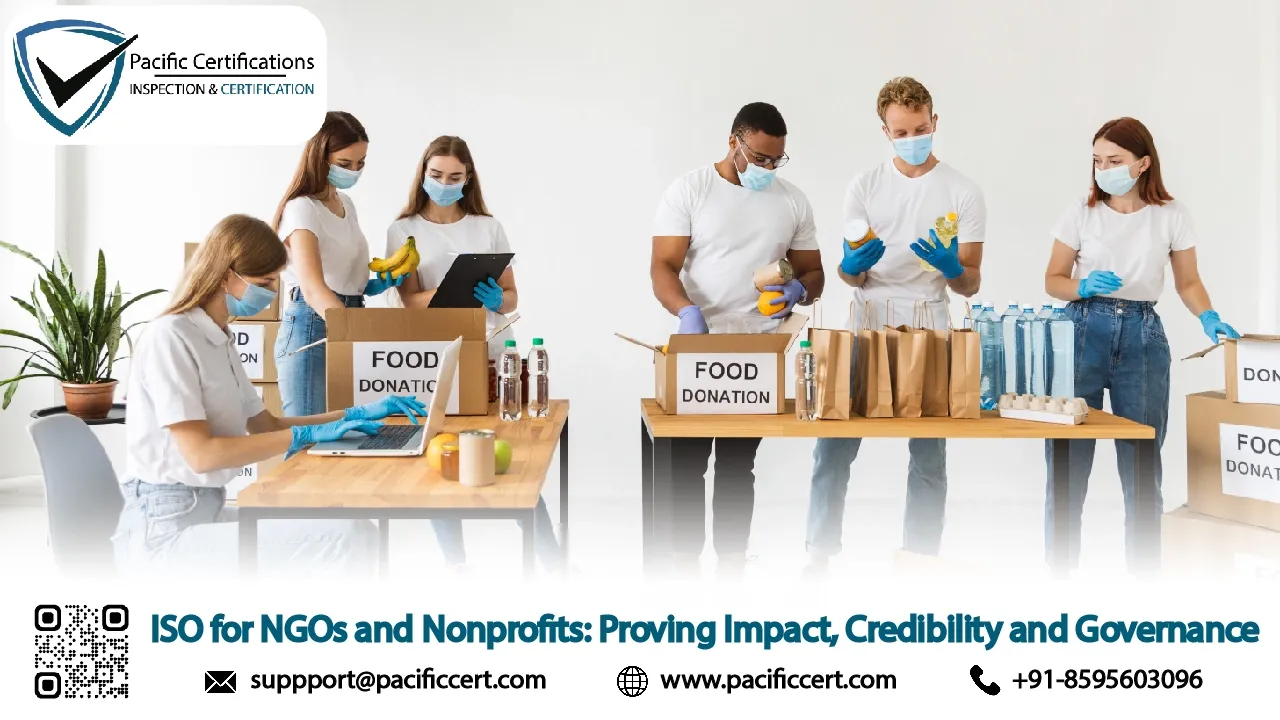ISO for NGOs & Nonprofits: Proving Impact, Credibility & Governance
Nonprofits and NGOs operate in a space where accountability, trust, and measurable impact define success. Donors, governments, and communities expect transparency, proper fund use, ethical governance, and evidence of results. ISO certifications can provide organizations in this sector with recognized systems that strengthen credibility, governance, and donor confidence.
Why ISO Certifications Matter for NGOs & Nonprofits?
Many NGOs face skepticism over how funds are used, whether programs deliver promised outcomes, and whether governance is robust. An ISO certification offers independent validation that processes are documented, risks are identified and handled, and internal controls are in place. For many international donors, certification is becoming a part of due diligence — helping NGOs win funding, partnerships, and legitimacy.
Relevant ISO Standards for NGOs & Nonprofits
Some standards that commonly benefit NGOs include:
-
ISO 9001 for quality management, helping improve project planning, monitoring, donor reporting and service delivery
-
ISO 37001 for anti-bribery, helping prevent misuse of funds, ensuring ethical procurement and whistleblower systems
-
ISO 14001 for environmental management, useful if operations or programs have ecological impact
-
ISO/IEC 27001 for information security, protecting donor, beneficiary and organizational data
-
ISO 26000 as guidance on social responsibility and ethical conduct in operations
Each of these standards reinforces different aspects: quality, governance, environment, security, ethics. Together, they help nonprofits operate transparently and consistently.
What Are the Requirements for ISO Certification in NGOs & Nonprofits?
To achieve certification, an NGO typically needs to:
-
Define the scope — which offices, programs or functions are covered
-
Develop policies covering quality, anti-bribery, environmental practices, data security, etc.
-
Perform risk assessments — fraud, reputational risks, program failure, data breach
-
Keep records — donor reports, monitoring logs, audits, training, governance documents
-
Train staff on compliance, ethics, data protection, reporting protocols
-
Put in place operational controls across finance, procurement, HR and program execution
-
Carry out internal audits, identify nonconformities, and take corrective actions
-
Hold management reviews, monitor KPIs, ensure continual improvement
How to Prepare for ISO Certification in NGOs & Nonprofits?
Start by assessing your current practices against ISO requirements (a gap analysis). Update policies and procedures for financial controls, reporting, risk management, and transparency. Train your teams, document evidence (reports, evaluations, audits). Pilot internal audits to find weak points. Define key indicators such as donor report turnaround time, fraud response time, beneficiary satisfaction rates. Ensure leadership is engaged in monitoring and resource allocation.
Certification Audit
The audit typically occurs in stages:
-
Stage 1 Audit: Reviews the governance, policies, risk assessments and readiness
-
Stage 2 Audit: Verifies implementation across field offices, program areas, administrative systems
-
Any nonconformities must be corrected with documented actions before certification is issued
-
Annual surveillance audits check if compliance continues
-
Recertification audits happen every three years to renew the certification
Benefits of ISO Certification in NGOs & Nonprofits
-
Stronger donor confidence and more competitive access to funding
-
Improved governance, reduced risk of fraud or mismanagement
-
Enhanced transparency in operations, reporting and program delivery
-
Better data protection and security of sensitive information
-
Greater legitimacy when engaging partners, governments, or beneficiaries
-
Integrated systems that combine quality, ethics, governance and security
More and more NGOs are adopting integrated management systems that combine ISO 9001, ISO 37001 and ISO/IEC 27001 under one framework. Trends include digital accountability dashboards, KPI-based donor SLAs, and linking program outcomes directly with ISO metrics.
How Pacific Certifications Can Help?
Pacific Certifications offers accredited ISO services for NGOs and nonprofits. Our auditors help you plan the scope, guide you through documentation and audits, and support evidence preparation. With our assistance, your organization can strengthen governance, drive transparency, and build donor trust.
Reach out at support@pacificcert.com or visit pacificcert.com to request an audit plan, cost estimate, or further guidance.
Read more: ISO for NGOs & Nonprofits: Proving Impact, Credibility & Governance

Comments
Post a Comment